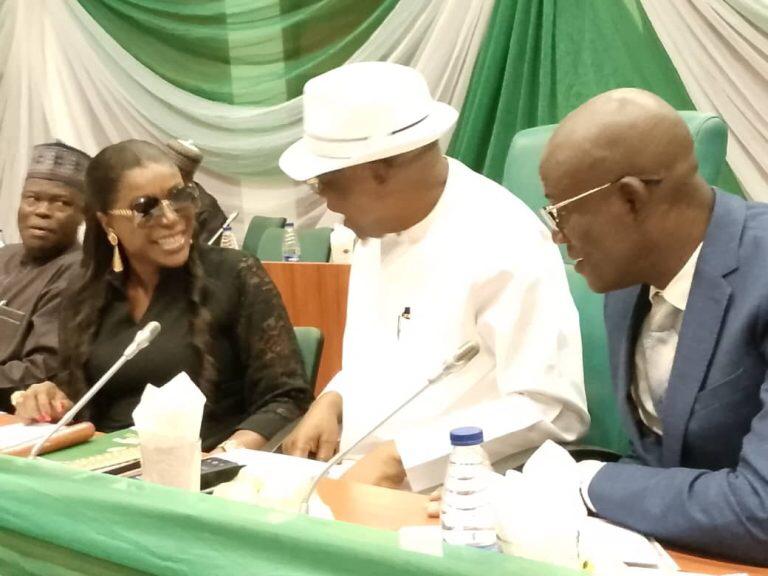
Reps Propose sanctions on CSR offenders in Nigeria.
Mercy Adi Abuja
The Nigerian’s House of Representatives’ Committee on Corporate Social Responsibility (CSR) took action on Tuesday to propose legislation for sanctioning offenders.
The Chairman Committee on Corporate Social Responsibility, Hon. Oby Orogbu At a public hearing in Abuja, articulated the following points regarding the bill aimed at regulating Corporate Social Responsibility in Nigeria and other related matters.
According to Hon. Orogbu, certain companies in the country have repeatedly violated the law, necessitating the imposition of appropriate punishments on them.
The committee issued a final warning to MTN and Airtel, urging them to attend their scheduled invitation or face potential arrest warrants.
Hon. Oby expressed his displeasure with the National Communications Commission (NCC), MTN, and Airtel, stating that they have repeatedly ignored the committee’s invitations. Consequently, the committee finds it necessary to exercise its authority by issuing a warrant of arrest.
“Section 89, Clause 8 of the Constitution mandates that individual companies appear before Parliament when invited. However, companies like MTN and Airtel are flouting this law, displaying arrogance in their reluctance to participate. We cannot allow such disregard. They benefit greatly from our nation and must respect our institutions.”
“As the regulatory body overseeing telecommunications, we must coordinate meetings between Parliament and telecom companies. They were granted operational powers in Nigeria, therefore refusing Parliament’s invitation is unacceptable and frowned upon. This is an opportunity to clearly express our stance.”
“If MTN is present and despite my efforts to engage them amicably about appearing before Parliament, they have declined. If you feel accountable, then it’s imperative that you attend. Accountability and responsibility are crucial, given their nationwide operations and disregard for our invitation.”
“We expect the Committee to uphold social responsibility. Please inform us of your current initiatives in this regard. Our intention is not to target any specific company. As a public affairs representative of NCC, kindly contact these telecom companies and urge them to make themselves available. Disregarding Parliament does not reflect responsible behavior.”
“Other companies appear, provide their accounts, and even undergo oversight. However, NCC is one company that has caused problems by insisting they are in court. This is not acceptable.”
During his presentation, representing the Central Bank of Nigeria, Mr. Wondi Ndanusa expressed the CBN’s support for the bill. However, he raised concerns about the proposed imprisonment penalty for defaulting companies, suggesting that a more persuasive approach would be preferable.
He also stated that many companies are currently burdened with significant financial responsibilities. He further proposed that the CSR (presumably referring to some form of regulation or oversight) should be housed within the Corporate Affairs Commission.
In response, the Committee Chairman said, “We have received numerous petitions regarding these companies causing issues in Nigeria. Construction, oil, and telecom companies have historically had undue influence, so I disagree that a persuasive approach would be effective.”
“Many companies fail to grasp this concept and repeatedly default, necessitating penalties to hold them accountable.
Also speaking at the hearing, Bala Wuoir, representing the Oil Producers Trade Section (OPTS), expressed concerns about the existing mandate in the Petroleum Industry Act (PIA), which requires oil companies in Nigeria to contribute three percent of their profits to the Niger Delta Development Commission (NDDC). He emphasized that adding additional mandates would further burden them.”
However, he called for oil companies to be exempted from the bill.
In response, the chairman of the committee insisted that they cannot receive exemptions. She emphasized that the committee requires oil companies to disclose their activities as part of their social corporate responsibilities. The bill aims to establish legal status and guidelines for corporate responsibility to enhance coordination and regulation.
Earlier, the Speaker of the House, represented by Leader Julius Ihonvbere, underscored the crucial role of public response and contributions in the legislative process.
He urged stakeholders to actively participate and make substantive contributions that would help translate the bill into actionable legislation.
“Public hearing is integral to our legislative process, fostering citizen engagement in lawmaking, particularly when proposed legislation directly affects the public. Your valuable insights and contributions are crucial to shaping the outcome of this meeting.”



